
DISCRETE APPLIED MATHEMATICS
Scope & Guideline
Unraveling Complexities in Discrete Applied Mathematics.
Introduction
Aims and Scopes
- Graph Theory and Combinatorics:
The journal emphasizes research on graph structures, properties, and algorithms, exploring topics like graph colorings, matchings, and connectivity. - Algorithm Design and Complexity:
Research on the development of algorithms for solving combinatorial problems, including complexity analysis and approximation algorithms, is a core focus. - Optimization Problems:
The journal covers a wide range of optimization problems, including network design, scheduling, and resource allocation, often employing mathematical and algorithmic techniques. - Discrete Structures and Their Applications:
It includes studies on discrete mathematical structures such as permutations, set systems, and matroids, often with applications in computer science and operations research. - Interdisciplinary Approaches:
The journal encourages interdisciplinary research that applies discrete mathematics in fields like bioinformatics, social networks, and game theory.
Trending and Emerging
- Advanced Algorithmic Techniques:
Research is increasingly focusing on sophisticated algorithmic frameworks, including approximation algorithms, randomized algorithms, and algorithms for NP-hard problems. - Interdisciplinary Applications:
There is a rising trend in the application of discrete mathematics to interdisciplinary fields such as bioinformatics, network theory, and data science, indicating a broader scope of interest among researchers. - Complex Network Analysis:
Studies centered around the analysis of complex networks, including social networks and biological networks, are gaining traction, reflecting the importance of understanding interactions in these systems. - Combinatorial Optimization in Real-world Applications:
Research that applies combinatorial optimization techniques to practical problems, such as logistics, scheduling, and resource allocation, is increasingly prominent. - Graph-based Machine Learning:
The intersection of graph theory and machine learning is emerging as a significant area of study, with applications in predictive modeling, clustering, and data representation.
Declining or Waning
- Classical Graph Theory:
While foundational topics in graph theory remain important, there is a noticeable decrease in publications focused solely on classical results, such as basic properties of graphs, in favor of more applied and complex problem-solving. - Basic Combinatorial Structures:
Research on simpler combinatorial structures, such as basic set theory or elementary combinatorial identities, appears to be less frequent, possibly overshadowed by more complex and applied topics. - Elementary Algorithmic Techniques:
The focus on straightforward algorithmic techniques is diminishing, with more emphasis shifting towards advanced methods, heuristics, and machine learning applications.
Similar Journals
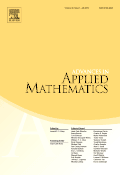
ADVANCES IN APPLIED MATHEMATICS
Unlocking the Potential of Mathematics for TomorrowADVANCES IN APPLIED MATHEMATICS, published by ACADEMIC PRESS INC ELSEVIER SCIENCE, is a prestigious journal that has served the mathematical community since 1980. With its ISSN 0196-8858 and E-ISSN 1090-2074, the journal is based in the United States, specifically in San Diego, CA. As a leading periodical in the field, it holds a notable Q2 ranking in Applied Mathematics and has been consistently ranked in the 43rd percentile among similar journals, illustrating its relevance and impact within the discipline. Although not an Open Access journal, ADVANCES IN APPLIED MATHEMATICS plays a crucial role in disseminating significant research findings, theoretical studies, and innovative applications of mathematics that address real-world problems. Researchers, professionals, and students alike will find valuable insights in its carefully curated publications, making it an essential resource for those looking to advance their understanding and application of mathematics.
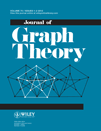
JOURNAL OF GRAPH THEORY
Advancing the Frontiers of Graph TheoryJOURNAL OF GRAPH THEORY, published by WILEY, stands as a pivotal resource in the fields of Discrete Mathematics and Combinatorics, as well as Geometry and Topology. Since its inception in 1977, this esteemed journal has fostered the dissemination of influential research, currently categorized in the prestigious Q1 quartile according to the latest metrics for 2023. With an ISSN of 0364-9024 and an E-ISSN of 1097-0118, it caters to a global readership of researchers, professionals, and students dedicated to advancing their knowledge in graph theory. By maintaining a strong rank in Scopus—39th out of 106 in Geometry and Topology, and 38th out of 92 in Discrete Mathematics and Combinatorics—it reflects its significance and impact within the academic community. Although it does not offer open-access options, its rigorous peer-review process ensures that only high-quality original research is published, thus reinforcing its reputation as a leading journal in this mathematical domain.
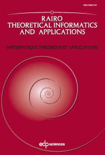
RAIRO-THEORETICAL INFORMATICS AND APPLICATIONS
Innovating Insights for the Future of Informatics.RAIRO - Theoretical Informatics and Applications is a renowned academic journal published by EDP Sciences S A that has been at the forefront of disseminating innovative research and applications in the fields of computer science and mathematics since its inception in 1995. With a focus on theoretical and applied aspects of informatics, the journal serves as a vital resource for researchers and professionals seeking to explore the intricacies of computational theories and their practical applications. Although currently lacking an Open Access model, it provides invaluable insights from distinguished researchers within its Q4 category rankings across its pertinent fields. As reflected in its Scopus rankings, including a position in the 24th percentile for General Mathematics and the 9th percentile for Computer Science Applications, RAIRO is pivotal in contributing to the ongoing discourse and advancements in theoretical informatics. Researchers, professionals, and students will find this journal critical in understanding emerging trends and challenges in the rapidly evolving domains of computer science and mathematics.
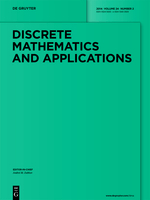
Discrete Mathematics and Applications
Empowering Research in Discrete Mathematics and Its Applications.Discrete Mathematics and Applications, published by WALTER DE GRUYTER GMBH, is a vital academic journal catering to the expansive fields of Discrete Mathematics and Applied Mathematics. With an ISSN of 0924-9265 and an E-ISSN of 1569-3929, it serves as a reputable platform for disseminating innovative research and developments within these domains. The journal has been contributing to the academic landscape since its inception in 1991 and continues to actively publish impactful studies through 2024. Despite its current positioning in Q4 of both the Applied Mathematics and Discrete Mathematics and Combinatorics categories, the journal is dedicated to fostering essential discussions that advance understanding and application of discrete mathematical concepts. It provides researchers, professionals, and students with access to a wealth of knowledge, encouraging collaboration and growth within the field. With its strategic German headquarters in Berlin and a focused aim to enhance the visibility and significance of discrete mathematics in real-world applications, Discrete Mathematics and Applications stands out as an important resource for those seeking to contribute to the ongoing evolution of mathematical sciences.

DISCRETE MATHEMATICS AND THEORETICAL COMPUTER SCIENCE
Pioneering Insights in Discrete Mathematics and Theoretical ComputingDISCRETE MATHEMATICS AND THEORETICAL COMPUTER SCIENCE, published by DISCRETE MATHEMATICS THEORETICAL COMPUTER SCIENCE in France, stands as a significant open-access journal since 1997, publishing innovative research articles within the intersecting disciplines of discrete mathematics and theoretical computer science. With an ISSN of 1462-7264 and an E-ISSN of 1365-8050, this journal aims to provide a platform for scholarly discourse and dissemination of knowledge, making it accessible to a global audience. It is recognized for its contributions, achieving a Q2 ranking in both Computer Science (Miscellaneous) and Discrete Mathematics and Combinatorics, alongside a Q3 ranking in Theoretical Computer Science as of 2023. The journal’s rigorous selection process ensures that only high-quality research is published, promoting advancements in these critical areas of study. Researchers, professionals, and students alike can benefit from its comprehensive articles that not only enhance theoretical understanding but also foster practical applications in the ever-evolving landscape of computer science.

Discrete Mathematics Letters
Exploring the forefront of mathematical sciences.Discrete Mathematics Letters is a prominent open-access journal dedicated to advancing the field of Discrete Mathematics and Combinatorics, published by Shahin Digital Publisher. Since its inception in 2019, this journal has rapidly established its presence in the academic community, securing a respectable Q2 category ranking in the 2023 Scopus database, positioning itself at rank #45 out of 92 in its field, making it a valuable resource for researchers and practitioners alike. With a commitment to disseminating high-quality research, Discrete Mathematics Letters provides an accessible medium for sharing innovative ideas and findings within the mathematical sciences, ensuring that researchers, students, and professionals stay informed about the latest developments. As an open-access journal, it provides free access to publications, fostering collaboration and knowledge exchange among the global research community.
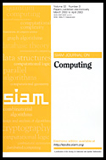
SIAM JOURNAL ON COMPUTING
Catalyzing Innovative Solutions to Computational Challenges.Welcome to the SIAM Journal on Computing, a premier publication of SIAM Publications dedicated to advancing the field of computational science. Established in 1984, this journal provides a platform for groundbreaking research and theoretical advancements that shape the landscape of both Computer Science and Mathematics. With an impressive impact factor and consistently ranking in Q1 quartiles for its categories, the journal remains an essential resource for scholars looking to contribute to innovative computational theories and methodologies. Although not currently an open-access journal, the SIAM Journal on Computing offers rigorous peer-reviewed articles, ensuring high-quality contributions that appeal to researchers, professionals, and students alike. As we converge towards 2024, this journal continues to play a vital role in influencing future research directions and fostering an academic community devoted to the exploration of computational challenges. Join us in exploring the forefront of computing research!

Australasian Journal of Combinatorics
Pioneering Research in the World of CombinatoricsThe Australasian Journal of Combinatorics, published by the CENTRE DISCRETE MATHEMATICS & COMPUTING, serves as a vital platform for researchers and professionals engaged in the dynamic field of discrete mathematics and combinatorics. With an ISSN of 2202-3518 and an E-ISSN of the same, this journal has been committed to open access since 2014, ensuring that groundbreaking research is readily available to a global audience. Based in Australia, specifically at the Department of Mathematics, University of Queensland, this journal spans the years from 1996 to 2024, showcasing the evolution of combinatorial research over nearly three decades. Recognized in the 2023 category quartiles as Q3 in Discrete Mathematics and Combinatorics, it ranks 68th out of 92 in Scopus, reflecting its growing influence despite its current percentile of 26th. The Australasian Journal of Combinatorics is dedicated to fostering innovative research and theoretical development, making it a valuable resource for academics and students alike.

Contributions to Discrete Mathematics
Unveiling new dimensions in combinatorial studies.Contributions to Discrete Mathematics, published by the Department of Mathematics and Statistics at the University of Calgary, serves as a vital platform for disseminating innovative research within the dynamic field of discrete mathematics and combinatorics. Established in 2008, this journal has rapidly gained recognition, currently holding a Q3 classification in discrete mathematics and combinatorics for 2023. As it aims to foster academic dialogue and share groundbreaking discoveries, the journal showcases high-quality peer-reviewed articles that cover a range of topics, from theoretical explorations to practical applications. Although it currently operates under a traditional subscription model, there is a growing commitment to enhancing access options, ensuring that critical knowledge is available to researchers and practitioners alike. With its notable Scopus ranking of #50 out of 92 within its category, this journal is positioned as an important resource for students, academics, and industry professionals who seek to stay at the forefront of discrete mathematics research.

DISCRETE MATHEMATICS
Advancing the frontiers of discrete mathematics.DISCRETE MATHEMATICS, published by Elsevier, is a leading journal dedicated to the field of discrete mathematics and combinatorics, with a distinguished presence in the academic community since its inception in 1971. With an ISSN of 0012-365X and an E-ISSN of 1872-681X, this esteemed journal has firmly established itself within the Q1 category for Discrete Mathematics and Combinatorics, and Q2 for Theoretical Computer Science as per the 2023 metrics, underscoring its pivotal role in advancing research in these vital areas. DISCRETE MATHEMATICS is highly regarded, reflected in its Scopus rankings, where it stands at #44 out of 92 in its primary category, contributing significantly to the global discourse on complex mathematical theories and applications. Published from the Netherlands, the journal serves as a crucial resource for researchers, professionals, and students looking to stay informed about the latest innovations and methodologies in discrete mathematics. Though currently not an open-access journal, DISCRETE MATHEMATICS continues to foster a vibrant scholarly community through rigorous peer-reviewed research, promoting a deeper understanding of the mathematical structures that underpin both theoretical and applied science.